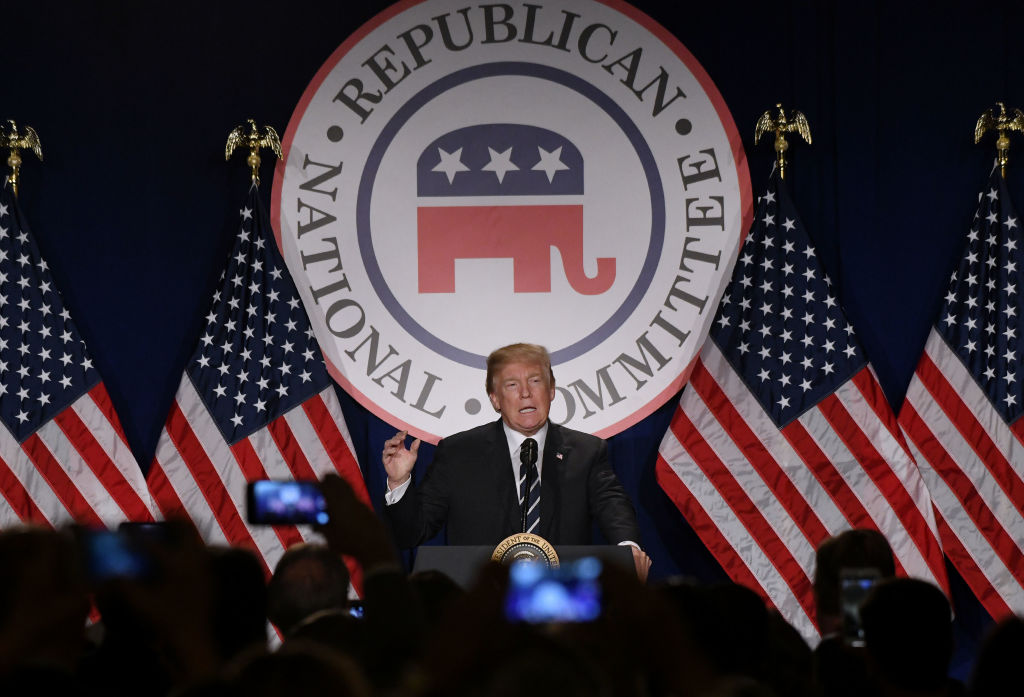Happy Monday! Given a spate of resignations this term, the GOP’s majority in the House of Representatives is coming close to being busted—much like most of our March Madness brackets …
Up to Speed
- After announcing last month he would not run for reelection this fall, Wisconsin Republican Rep. Mike Gallagher revealed Friday he will resign effective April 19. “Four terms serving Wisconsin in Congress has been the honor of a lifetime and strengthened my conviction that America is the greatest country in the history of the world,” he wrote in a statement on X. “I will forever be proud of the work I did on the Armed Services and Intelligence Committees, chairing the Cyberspace Solarium Commission, and chairing the Select Committee on the Chinese Communist Party.” With Gallagher’s departure, the House loses a hawkish voice on China and a primary driving force behind the bill to force Chinese-owned ByteDance to divest from TikTok. His resignation will also shrink the Republican majority to 217-213, meaning the GOP can lose only one vote and still pass a piece of legislation if Democrats are united in opposition to it. Speaker Mike Johnson on Monday appointed Rep. John Moolenaar of Michigan to take Gallgher’s place as head of the China committee.
- Gallagher joins the growing list of House Republicans leaving Congress in the middle of this term. Friday was the last day for Ken Buck of Colorado, who similarly decided not to run for reelection before abruptly announcing his exit earlier in the month. Bill Johnson of Ohio, who was expected to leave in early March, exited in late January and now serves as the president of Youngstown State University. And, of course, Kevin McCarthy resigned at the end of 2023 after eight populist Republicans successfully spearheaded an effort to remove him from the speakership, getting every Democrat to vote with them.
- But drama erupted surrounding the timing of Gallagher’s departure. Wisconsin law stipulates that, because he will resign after the second Tuesday in April, his seat will be filled in the regular November contests and not a special election. Allies of former President Donald Trump have called on Gallagher to resign earlier than he had planned—among them activist Alex Bruesewitz, who was considering mounting a primary challenge to the outgoing congressman. “On Monday, pick up your phone, call Mike Gallagher’s office, and demand he resigns before April 2,” Bruesewitz said at an event in the district over the weekend. He called for Gallagher’s expulsion if the outgoing congressman does not resign before that date. Gallagher in his Friday statement said he “worked closely with House Republican leadership” on his timeline.
- NBC News announced Friday that Ronna McDaniel will join the network as an on-air contributor, saying she will provide “an insider’s perspective on national politics and the future of the Republican Party.” On Sunday during her first Meet the Press appearance since her hiring, McDaniel told host Kristen Welker that she disagrees with Trump’s plan to pardon January 6 rioters. Asked why she did not say so until now, she replied, “When you’re the RNC chair, you kind of take one for the whole team, right? Now I get to be a little bit more myself.”
- McDaniel’s hiring has faced no shortage of backlash inside the company. As the Wall Street Journal reported Sunday, the more left-wing MSNBC has no plans to have her on the channel. NBC has not even escaped criticism from hosts on its own shows. Chief political analyst Chuck Todd said on air to Welker after she interviewed McDaniel that the network owed Welker “an apology.” “There’s a reason why there’s a lot of journalists at NBC News uncomfortable with this, because many of our professional dealings with the RNC over the last six years have been met with gaslighting,” he said.
- New Jersey first lady Tammy Murphy on Sunday dropped out of the race to replace embattled Democratic Sen. Bob Menendez, who announced last week that he will not run in the party’s primary but left the door open for an attempt as an independent. Murphy’s withdrawal effectively clears the way for Rep. Andy Kim to take the Democratic nomination for the seat in a state that has not elected a Republican senator since 1972. Though Murphy was at first a favorite for the nomination, many in the state recoiled at the optics of sending her to the Senate given her ties to Gov. Phil Murphy, her husband.
What Critics Miss About the Trump/RNC JFC

After Donald Trump established a joint fundraising committee (JFC) with the Republican National Committee, the former president’s critics cried foul. Top Trump adviser Chris LaCivita had provided assurances that the RNC would not divert donor money from campaign activities to cover the cost of the presumptive Republican nominee’s legal bills. And yet this JFC, the critics charged, was proof that the opposite was in the works. But is that, in fact, the case?
Here at Dispatch Politics, we … don’t think so.
First, it’s important to understand the nature and purpose of a joint fundraising committee. Federal law caps individuals’ contributions to campaigns and political parties. Even the wealthiest financier can only write Trump’s 2024 general election presidential campaign (or that of President Joe Biden) a check for $3,300. The most said donor can give to the RNC (or the Democratic National Committee) is $41,300. So, to effectively skirt those limits and collect more money from individual Democratic and Republican financiers, the presidential nominees establish JFCs.
Doing so doesn’t only allow presidential nominees to accept eye-popping checks from wealthy campaign contributors, it also allows their campaigns to control how the money is spent. For instance, super PACs are single entities that can accept donations from individual contributors in unlimited amounts. But under federal law, super PACs are prohibited from coordinating with the candidates they support. The RNC and DNC and their state and local affiliates are permitted to work hand-in-glove with the Republican and Democratic presidential nominees, respectively.
That means six-figure contributions to the Trump/RNC JFC and Biden/DNC JFC go much farther in many instances than some seven-figure donations to each candidate’s supportive super PAC. Besides, the wealthiest donors can afford to write checks to both a JFC and a super PAC. All of which gets us back to the joint fundraising agreement Trump inked with the RNC.
The aptly named Trump 47 Committee JFC, which can accept a maximum of $824,600 from individual donors, is an agreement between the Trump campaign, the RNC, and a collection of state Republican parties across the country. That’s much like Mitt Romney’s JFC with the RNC in 2012 when he was the GOP nominee. Nor is it any different than Trump’s JFC in 2016, formed after he became the presumptive nominee. But there’s an extra component to the 45th president’s 2024 JFC with the RNC: Save America, a political action committee.
Save America is what is typically called a leadership PAC. Under federal law, it can accept a maximum of $5,000 annually from individual donors—not much money in the grand scheme of fundraising from big-time donors. Still, Save America’s inclusion in the Trump 47 Committee has raised eyebrows, both because it receives its share of any donation to the JFC ahead of the RNC receiving its cut—and because it’s the entity Trump has been using to pay the lawyers representing him in multiple criminal and civil cases.
This might make it appear, in a round-about way, as though the presumptive GOP nominee is using the RNC to underwrite his legal bills. He’s not.
Trump’s JFC is designed to haul in large checks from wealthy party financiers, and the sort of donor who is going to contribute to this committee is going to give enough such that the RNC is highly unlikely to be deprived of the $41,300 it is permitted to accept under federal limits. That’s even if Republican donors who fund the Trump 47 Committee JFC give less than the $824,600 maximum.
The most that could be said about the $5,000 reserved for Save America under the JFC agreement is that it’s taking money out of circulation that might otherwise be available to help Trump and down-ballot GOP candidates win their elections. That’s not nothing, but it’s not the same as the RNC taking money out of its coffers to pay for the former president’s extracurricular activities. Meanwhile, here’s Trump campaign spokesman Steven Cheung’s justification for including Save America in the JFC:
Save America also covers a very active and robust post-Presidency office and other various expenses not related to fighting the illegal witch-hunts perpetrated by Crooked Joe Biden. The Trump campaign, the RNC, and state GOP parties ultimately receive the overwhelming majority of funds raised through the Trump 47 Committee. Out of an Individual donor’s maximum contribution of $824,600, less than 1% (.006%) goes to Save America.
The Trump Trials’ Unlikely Financial Lifeline
Donald Trump is scrambling for cash, and not just to narrow the fundraising advantage President Joe Biden and the Democrats have. Monday was originally the deadline for the former president to secure a bond for the more than $450 million he owes, including interest, as a result of the New York civil fraud case that concluded earlier this year. A court Monday, however, threw the presumptive Republican nominee a lifeline: It ruled Trump can post a bond for $175 million within 10 days while he appeals the original amount.
But before that, Trump had been thrown a far more unlikely lifeline: Grant Cardone, a Florida-based businessman, real estate investor, and internet-famous sales coach. Cardone isn’t exactly covering Trump’s massive bill, but he and his wife Elena have started a GoFundMe page to “Stand with Trump” and “fund the $355 million unjust judgment” against him. Since launching in mid-February, the Cardones’ fundraising campaign has raised nearly $2 million from more than 32,000 donations—driven in large part by the couple’s promotion of the page on their social media channels and friendly media coverage of their effort.
Neither Grant nor Elena Cardone is among those listed by name as having donated, but Elena does write in the initial post on the page that she and her husband stand with Trump “shoulder to shoulder, ready to support, defend, and fight back against a system that threatens to undermine the very foundations of our republic.” She also wrote about her “commitment to transparency and accountability” about the fund and its disbursement.
The Cardones appear to be enthusiastic Trump supporters. According to OpenSecrets.org, both have donated to multiple Republican candidates in the past. Grant Cardone has made regular appearances on cable news and in the past even contributed articles to CNBC’s website, often presenting himself as a personal finance or investing expert. His most recent hits on Fox News and Fox Business, however, have concerned his pledge to stop conducting business in the state of New York following the judgment against Trump.
In 2022, Trump appeared at one of Grant Cardone’s conferences as a “surprise” guest and even sat with Cardone for a “fireside chat.” But it’s unclear if Cardone is personally close to Trump. The Cardones both attended the recent UFC 299 event in Miami where Trump made a personal appearance, and Grant posted a photo on X of the former president from across the arena.
What remains unanswered is how, exactly, this money will be delivered to Trump to pay his legal expenses. Elena Cardone initially wrote on the GoFundMe page that her lawyers were “diligently working to ensure the funds are utilized properly.” In a February 27 update post, she wrote that they are “currently in communication with President Donald Trump’s team to ensure that he can and will accept the funds raised,” and promised that every dollar “will be used only to cover fines related to the New York civil fraud case, its appeal, and any related expenses.”
Further questions to the Cardones from The Dispatch have not yielded any more specific answers about when and how the money they are raising will be distributed. After placing a call late last month to Cardone Capital, an employee put The Dispatch on hold for an extended time. (The hold music consisted of audio of Grant Cardone speaking about his “10X Rule,” the basis for his books, coaching seminars, and speaking engagements.) Finally, the employee said he would pass along a reporter’s information to a spokeswoman for Grant Cardone, who called and told The Dispatch to email questions in order to get a direct response from Cardone.
Among the questions asked to Cardone were:
- Who are you donating this money raised at GoFundMe to? A trust, a bank account owned by Donald Trump, or some other entity or person? And what are the plans for the transfer?
- Have you made any transfers yet?
- Have you been in touch with Donald Trump or a representative about the donation? What indications do you have that Trump will accept the money? What will happen if Trump declines to accept the donations?
- Do you know who the donors are, or are all of the anonymous donors masked from you?
- How much have you and your wife donated to the fund?
In an email response to those questions, the spokeswoman said Cardone is “traveling and it’s been touch and go,” and that he would be unable to respond. The spokeswoman did not respond to two additional requests for comment in the last three days.
Meanwhile, a spokesman for Trump’s campaign also did not respond to questions from The Dispatch about whether the former president has been in touch with Cardone or received any communication about a transfer of the money.
The Cardones’ campaign is not the first to use GoFundMe to raise money to assist Trump. Most notoriously, a campaign started by supporters of Trump called We Build the Wall promised to raise money to help build a wall along the southern border, as promised by then-President Trump. Two co-founders of the fundraising campaign pleaded guilty to stealing money from donors and were sentenced to yearslong prison sentences. Among those linked to the fundraising group were former White House adviser Steve Bannon, who was investigated but pardoned by Trump just before he left office in 2021.
Notable and Quotable
“Mike Gallagher’s extremely selfish decision to leave Congress early and push us towards a Hakeem Jeffries speakership should not be allowed to happen. Mike Gallagher should be expelled so the people of Wisconsin’s 8th District can have a special election to replace him.”
—Rep. Marjorie Taylor Greene on the timing of Rep. Mike Gallagher’s departure from Congress








Please note that we at The Dispatch hold ourselves, our work, and our commenters to a higher standard than other places on the internet. We welcome comments that foster genuine debate or discussion—including comments critical of us or our work—but responses that include ad hominem attacks on fellow Dispatch members or are intended to stoke fear and anger may be moderated.
With your membership, you only have the ability to comment on The Morning Dispatch articles. Consider upgrading to join the conversation everywhere.